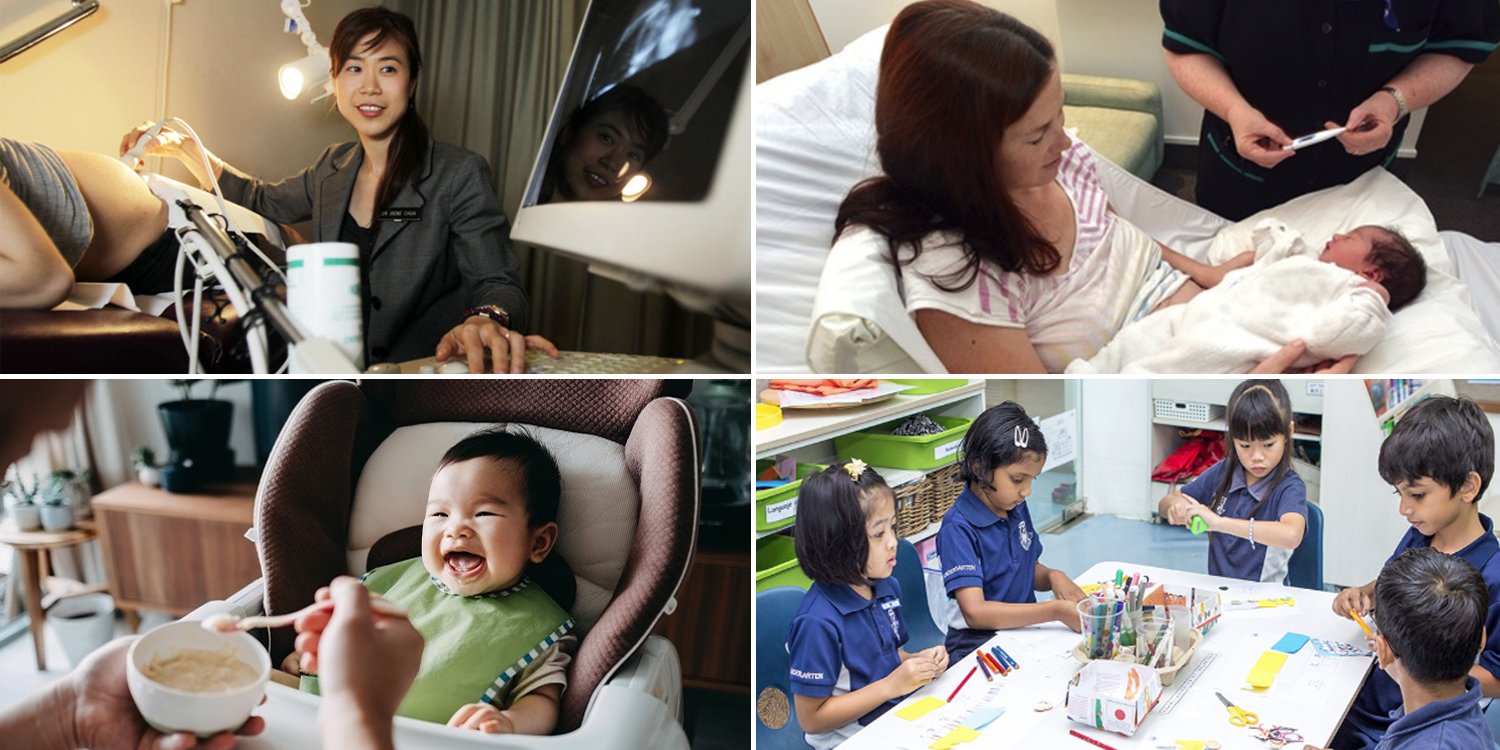Cost Of Pregnancy, Delivery & Raising A Young Child In Singapore
Most potential parents see starting a family as an exciting endeavour. Not only will you have a little one to cuddle and watch grow up, you’ll also get to decide on things like how to get them ‘Best Dressed’ at their kindergarten parties. However, there are also decisions, practical ones, to make which can be overwhelming.
To reorient new parents for the bubbling new life, here’s a short guide to ground you and help you make sense of some of the important expenses through your journey of pregnancy up till your child’s early pre-schooling years.
*Note: All figures are estimated figures as every parent will spend differently on their children.
Stage 1: Pregnancy — caring for the bump in your belly
Pregnancy is at once thrilling and nerve-racking. The bump is a sign that a ball of joy is on the way. On the other hand, the number of tests you have to go for can be confusing and daunting. But calm yourself, spend just an hour reading through them, and you’ll do fine. Here’s a breakdown of those you’ll have to go for to make sure that the baby is healthy and that you’re on track to a smooth delivery:
1st trimester
- Blood tests — $100/visit
2nd & 3rd trimester
- Prenatal test package — $1,000 to $2,000
- Ultrasound (to check for down syndrome) — $300 to $500
On top of the costs of paying the doctor regular visits, you’ll also need to keep yourself – being the vessel of your child – in the pink of health. This means additional vitamins and supplements. These are just as important as the checkups because nutrition is especially critical to a healthy development of the baby and the parents themselves.
Caring for the baby also means caring for yourself. You can start by doing simple exercises. Yes, being pregnant doesn’t mean you should be lying down resting all day. In fact, exercise – as long as it’s not overdone – will not only lift your mood and prepare your body for labour.
Stage 2: Delivery — choosing what’s right for you
 Ward A bed at KK Women’s and Children’s Hospital
Ward A bed at KK Women’s and Children’s Hospital
Source
When it comes to the delivery, there are two things to consider.
There are hospitals in the public and private sector with differences in the cost. The first step is to choose the right hospital that provides the right services best suited to your needs.
The next step is to tell the doctor if you prefer a natural or caesarean delivery. The former is usually cheaper than the latter for the following reasons:
- Hospital stays for natural deliveries are shorter
- Recovery times after natural deliveries are shorter
- Caesarean deliveries require major surgery
In general, most deliveries are natural and mothers opt for caesarean only if they are giving birth to more than one child at a time (i.e. twins, triplets) of if the doctor advises so. For more details, you can visit here.
Below is a summary of the costs of deliveries*:
Public:
- Normal — $2,000 to $5,000
- Caesarean — $6,000 – $10,000
Private:
- Normal — $6,000 – $10,000
- Caesarean — $9,000 – $17,000
For the full list of prices across all hospitals, see here.
Life experiences come unexpectedly. It is also crucial to purchase prenatal or other relevant insurance that covers the mother and her child. You would also have to factor in as a cost during your pregnancy.
*Figure from MOH via NTUC Income.
Stage 3: Infancy — nursing the little bundle of joy
Now that the little one has opened its eyes, it’s time to make some lifestyle choices for him or her. We’re talking about choosing food that will make them gleeful rather than cry, clothes that will make them look bright and happy, cots, curtains, milk powder, snacks and so forth. Some parents may also choose to doll up the nursery room for their bundle of joy.
If you’re having your first born or the next child, this is where a confinement lady comes in handy. They provide additional support to mothers, so they can cope better with the new changes, and ease them into the motherhood.
For the child:
- Essentials (milk powder, diapers, etc.) — $300 to $400/month
- Health checkups (including vaccinations) — minimum $100/month
For mummy:
- Confinement nanny (1 month) — $2,000 to $4,000*
*Prices from Just Us Childcare & Eldercare and JIA Confinement.
Stage 4: Preschool — letting him explore the world
When your child hits the age of 2 or 3, they are ready for preschool. It is important to prepare your child for this big transition as it will be the first time they will be interacting with others their age.
To start off, you’ll need to pick the right preschool. You should be asking questions like: what will my child be taught, how is the standard of hygiene, how qualified are the teachers, and of course, how much you are willing to pay.
Childcare centre fees— $700 to $3,000/month*
Paediatrician — $80 to $150/visit**
*Figures taken from CardUp.
** Figures taken from Money Smart.
Note: When your kiddo hits around 3 years old, that’s when you can start “assigning” them mini tasks to build their character and independence like giving them a piggy bank.
Childcare subsidies & bonuses
Caring for a child, while exciting and joyful, can nevertheless be costly. This is why the government has in place plenty of supportive measures for new parents to help them financially with raising a child. The main ones include a cash bonus and a grant when you set up something called a Child Development Account.
- 1st and 2nd child — $8,000/child
- 3rd and subsequent child — $10,000/child
First Step Grant:
- $3,000 credited into Child Development Account (CDA)*
*For more information about the CDA, visit here.
Tax reliefs and rebates
Working mothers get to have less of their income taxed under the Working Mother’s Child Relief:
- 1st child — 15%
- 2nd child — 20%
- Subsequent — 25% each
- Capped at 100%
Parents caring for handicapped children are further entitled to additional reliefs like the Handicapped Child Relief, which takes another $7,500 off your taxable income.
Other than reliefs, you’ll also get to enjoy the Parenthood Tax Rebate where you get to claim back the money you paid in taxes:
1st child — $5,000
2nd — $10,000
Subsequent — $20,000 each
A delightful new addition to the family
Having a child may be a dream come true. But while you’re watching the little one grow up, don’t forget about your expenses. After all, you are their pillar of support before they are ready to live independently and in return, take care of you.
The cost of raising a child can come up to quite a surprising amount. This coupled with other expenses you might have such as paying a home loan, or even trying to get your business on its feet, can strain your finances. A personal loan can help you manage your financials better and ensure that you have all the preparations in place for a new addition to the family without compromising on your current lifestyle.
HSBC Personal Loans offer interest rates from as low as 3.7% (effective interest rate of 7% p.a.) with a 1 minute approval in-principle, and you’ll get the option of either a fixed or flexible repayment.
While the initial costs of having a child can be intimidating at first sight, a personal loan can help the household meet any shortfall parents experience during the stage of welcoming a new addition to the family.
Find out how to fund your dreams with HSBC Personal Loans.
This post is brought to you in collaboration with HSBC Personal Loans.
Featured images adapted from MOH, Chatsworth, NutraIngredients, MotherAndChild.

Drop us your email so you won't miss the latest news.















